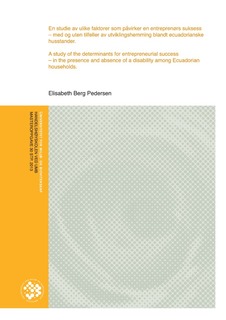| dc.description.abstract | According to the United Nations, the right to work is a human right. Yet many marginalized
people in developing countries have limited opportunities to get employed and earn an income,
and among these persons are disabled people frequently represented. Entrepreneurship often
becomes a tool to overcome unemployment, and in Ecuador about 25% of the urban population
is self-employed. To achieve success adequate access to financial, human and social capital is
acquired, all of which claimed to have a positive correlation with success. The trend indicates
that marginalized people, and especially the disabled, often have limited access to such capital.
Quantitative methods have been used to analyse the relationship between various factors
defining the different types of capital, and annual income of entrepreneurs. Entrepreneurs are
divided into groups based on whether he / she or someone in his/her household is affected by a
disability or not. The relationship between financial, human and social capital, and annual
income, is analysed in order to investigate whether these relationships change because of a
disability disabilities. A survey was conducted on entrepreneurs that are all clients of a
microfinance institution, and is therefore secured access to financial capital, in the coastal region
of Ecuador in the period January-February 2013.
The results of the analysis show that there is a significant relationship between financial capital
and annual income. This strong correlation is applicable to all entrepreneurs, and is strongest in
those cases where a disability is present. It also found an overall significant positive relationship
between human capital and income. But when separating the entrepreneurs into groups, the
relationship is no longer considered significant. Finally, we find an overall significant and
positive relationship between social capital and annual income. After the division is made, this
relationship remains positive and significant for those entrepreneurs who are affected by a
disability, while the correlation between income and social capital for entrepreneurs who are not
affected by a disability changes to become negative. Our results encourage donor organisations,
institutions and the Ecuadorian government put more effort into improving the access to the
various types of capital to meet demand, and increase the probability of success. This suggestion,
and the findings of the study, is supported by previous research and theory. | no_NO |
